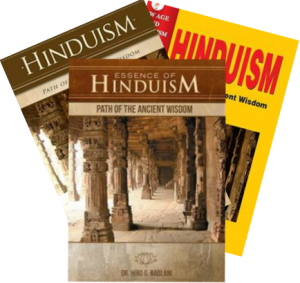Preface
At the very outset, I wish to make it clear that this volume is not a new book; it is rather like a new edition of the previous book. I have also decided to change its name from “Hinduism: Path of the Ancient Wisdom” to “Hinduism: An Evolutionary Religion”, and have added significant new passages, especially in reference to the new subtitle, to justify and explain the change. Indeed, it has been rather hard for me to part with the old name for that was very relevant and even more close to my heart. After good deal of deliberation, I decided to make the change, hoping that it work out for the better.
Hinduism is now regarded as the oldest living religion of the world. It is ancient, with its roots going back to almost 10,000 years. Even so it has remained dynamic, as the American philosopher J. B. Pratt has aptly put: “The reason for the immortality of the Vedic religion of Hinduism is that while retaining its spiritual identity, it has been changing its outward form in accordance with the demands of the time; and particularly it is the only religion which has been able to meet the challenges of science, which governs the thought and life of the Modern age.” This vibrant character, in fact, is also the reason of its survival through millennia, when most other prehistoric religions have almost disappeared. More importantly, the changes have taken place in a subtle manner, without any serious protest and bloodshed. Often there is some resistance observed at the onset of “change”; this is natural. Some changes are however unavoidable, and also very necessary; we may therefore keep an open mind, and accept these serenely and amicably. In Hindu culture, the old are always revered and not openly defied and antagonized. Old philosophies, rituals and customs have sustained alongside new ones, leaving individuals to decide for themselves as per their personal choices. It is not uncommon in a Hindu family for members to worship different deities. Differences also exist in choosing various rituals and religious practices.
At the end of each chapter is a small write-up by me, which elaborates on the changes that have taken periodically through the centuries.
It is imperative to realize that Hinduism was not started by one single founder. It is rather like a conglomeration of the spiritual wisdom of many ethnic tribes that inhabited the Indian subcontinent in the ancient period. Thus it absorbed the “pluralistic” character at the very beginning. In accommodating the opinions and beliefs of many, it also acquired the character of becoming non-dogmatic and unbiased. This attitude has been maintained in the Hindu psyche throughout centuries. Religious masters and “Rishis” have repeatedly prompted us to maintain harmony and peace, and to look at all beings as creatures of one divine family – “Vasudhaiva Kutumbkum”. In the earliest of the Hindu scriptures, the Rig Veda, another foremost principle has been inscribed, “Ekan Sat, Viprah Bahuti”, which translates as “There is one Truth, the paths leading to it may be many”. The book repeatedly emphasizes the essential unity and homogeneity of all religions. With this eternal principle in mind, at no time has any Hindu religious leader ever claimed that Hinduism is the only way to salvation or God-realization. Over a long period spanning many centuries, Hindus have also refrained from using any kind of pressure tactics to convert others into Hinduism. It is rather unique that in many Hindu scriptures and hymns (bhajans), names of other religions and messiahs are freely used with utmost reverence and devotion. In this book, I have strived to uphold and support that universal philosophy, which according to me is also the greatest asset of Hinduism.
Of late, there has been an undue and rather unnecessary discussion regarding Religion vs Spirituality. Some persons claim that they are “spiritual” but not “religious” intending to mean that they are moral and virtuous, but do not belong to any religion. This new thinking, however, has also created some confusion and misunderstanding, creating doubts whether religion and spirituality are antagonistic to one another! This is not true. All religions basically teach us to live moral and virtuous life and shun vice and wickedness. Without the spiritual teachings, what other role does a religion have to play?
Hindus have undoubtedly suffered to a great extent, especially at the hands of those who have wrongfully invaded and exploited them, often very mercilessly and ruthlessly. Feelings of hatred, revenge, and acquiring justice are very understandable in such conditions. Even so, our spiritual masters have always taught us to be compassionate, to strive for peace, and not to indulge in a tit for tat plan. We may always endeavor to do everything possible to dutifully defend our land and our people, but we may not part with our divine values of moral and ethical living. History is witness that people who have remained committed to such spiritual ideals have always survived and succeeded. Hindu society has paid dearly for becoming rather docile and passive in the face of unjust aggressions in the past; those mistakes and missteps may be avoided in future. Ramayana and Mahabharata provide with truthful and appropriate guidance.
This book also contains a lot of unique information that I hadn’t included in the previous version. Hinduism is a vast, almost infinite database; whenever I come across any new and important piece of material about Hinduism, I have made an attempt to update my writings with the same.
In writing this book, I claim nothing original. I have taken the help of many religious scriptures, met and communicated with a number of Reverend Swamis and learned scholars, and gone through scores of books. I have acknowledged them properly in the earlier volumes of my work and also uploaded the same on the website of the book. I have maintained the same chronological pattern in the book, from the very earliest to the present day endeavors. The earlier book has been appreciated by many, who kindly endorsed it as a “mini encyclopedia” of Hinduism. I take this opportunity to thank everyone with all my heart for their generous comments and opinions, some of which are also published in this edition as well as on the website of the book www.hinduismpath.com. I invite all my readers to note down their relevant positive remarks and queries in the “Reader’s Column” on the aforementioned website; I shall strive to reply individually as suitable, and also include any new valuable information suggested by them in the future version of the book. It is also my earnest wish to create a permanent editorial board, which will oversee the periodic update and other aspects of this manual in the future.
I have also uploaded the entire edition of this book on the website, free of cost for anyone to read. It is my earnest wish that the youth, both in India and abroad read and acquaint themselves with the worthy and glorious attributes of our religion and culture; the book is dedicated to them.
In compiling this new edition, young editor Mansi Motwani has put lot of sincere efforts; I sincerely appreciate and thank her. My old friend Eric Esquivel and my wife Kamla have continued to remain the strong pillars of personal support; I simply cannot thank them enough.




